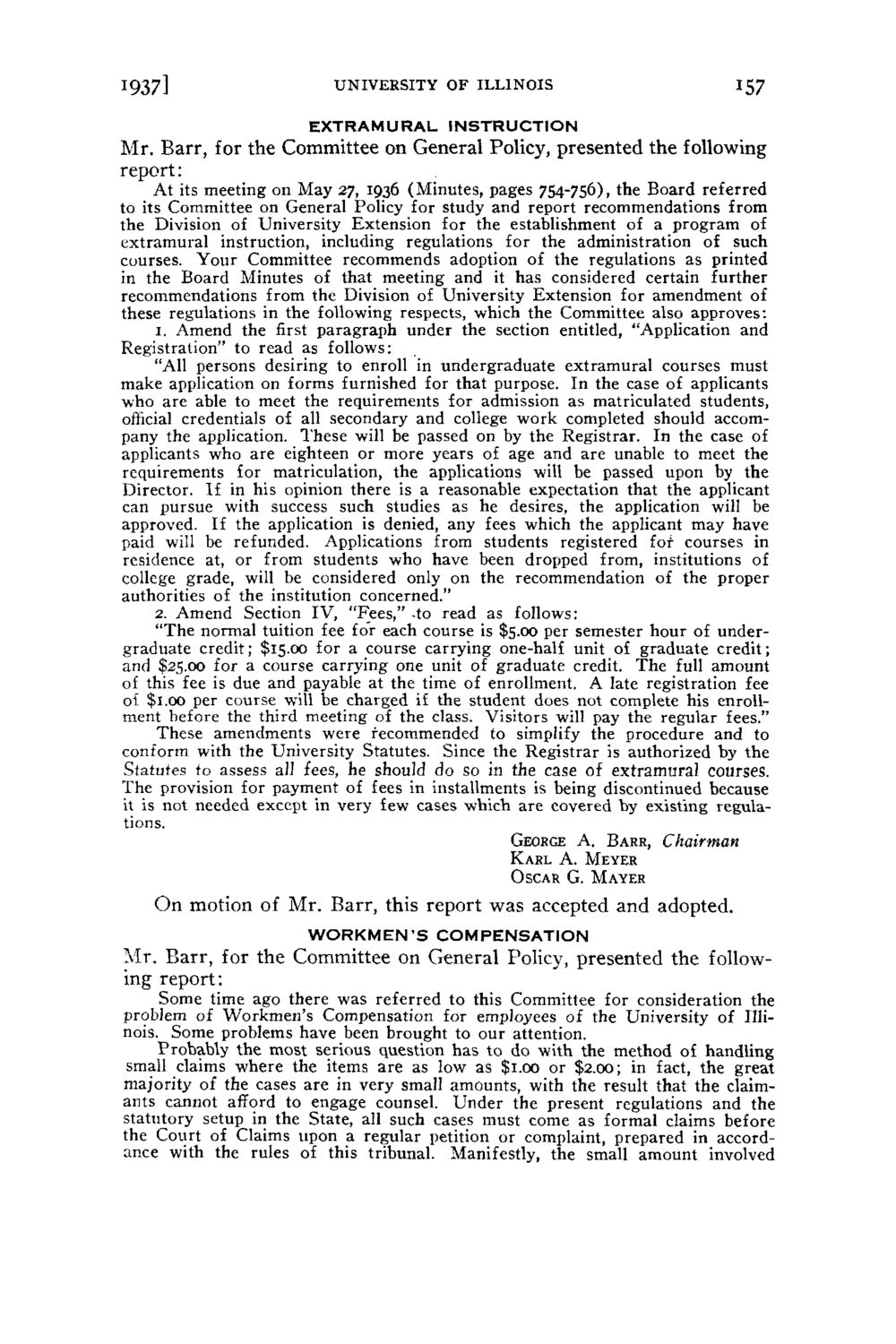| |
| |
Caption: Board of Trustees Minutes - 1938
This is a reduced-resolution page image for fast online browsing.

EXTRACTED TEXT FROM PAGE:
1937] UNIVERSITY OF ILLINOIS EXTRAMURAL INSTRUCTION 157 Mr. Barr, for the Committee on General Policy, presented the following report: At its meeting on May 27, 1936 (Minutes, pages 754-756), the Board referred to its Committee on General Policy for study and report recommendations from the Division of University Extension for the establishment of a program of extramural instruction, including regulations for the administration of such courses. Your Committee recommends adoption of the regulations as printed in the Board Minutes of that meeting and it has considered certain further recommendations from the Division of University Extension for amendment of these regulations in the following respects, which the Committee also approves: 1. Amend the first paragraph under the section entitled, "Application and Registration" to read as follows: "All persons desiring to enroll in undergraduate extramural courses must make application on forms furnished for that purpose. In the case of applicants who are able to meet the requirements for admission as matriculated students, official credentials of all secondary and college work completed should accompany the application. These will be passed on by the Registrar. In the case of applicants who are eighteen or more years of age and are unable to meet the requirements for matriculation, the applications will be passed upon by the Director. If in his opinion there is a reasonable expectation that the applicant can pursue with success such studies as he desires, the application will be approved. If the application is denied, any fees which the applicant may have paid will be refunded. Applications from students registered for courses in residence at, or from students who have been dropped from, institutions of college grade, will be considered only on the recommendation of the proper authorities of the institution concerned." 2. Amend Section IV, "Fees," 4o read as follows: "The normal tuition fee for each course is $5.00 per semester hour of undergraduate credit; $15.00 for a course carrying one-half unit of graduate credit; and $25.00 for a course carrying one unit of graduate credit. The full amount of this fee is due and payable at the time of enrollment. A late registration fee of $1.00 per course will be charged if the student does not complete his enrollment before the third meeting of the class. Visitors will pay the regular fees." These amendments were recommended to simplify the procedure and to conform with the University Statutes. Since the Registrar is authorized by the Statutes to assess aJ] fees, he should do so in the case of extramural courses. The provision for payment of fees in installments is being discontinued because it is not needed except in very few cases which are covered by existing regulations. GEORGE A. BARR, KARL A. MEYER OSCAR G. MAYER Chairman O n m o t i o n of M r . B a r r , t h i s r e p o r t w a s a c c e p t e d a n d a d o p t e d . W O R K M E N ' S COMPENSATION M r . B a r r , for t h e C o m m i t t e e on G e n e r a l Policy, p r e s e n t e d t h e following report: Some time ago there was referred to this Committee for consideration the problem of Workmen's Compensation for employees of the University of Illinois. Some problems have been brought to our attention. Probably t h e most serious question has to do with the method of handling small claims where the items are as low as $1.00 or $2.00; in fact, the great majority of the cases are in very small amounts, with the result that the claimants cannot afford to engage counsel. Under the present regulations and the statutory setup in the State, all such cases must come as formal claims before the Court of Claims upon a regular petition or complaint, prepared in accordance with the rules of this tribunal. Manifestly, the small amount involved
| |